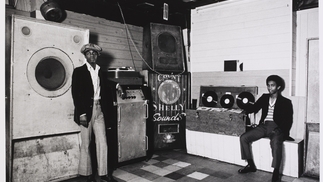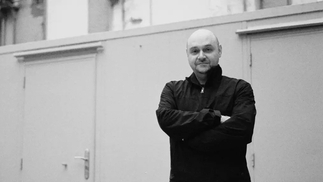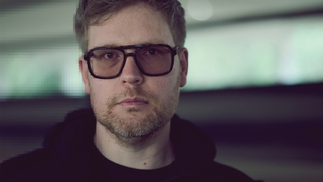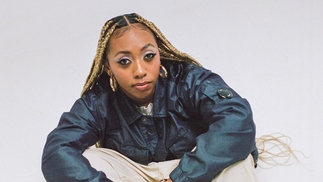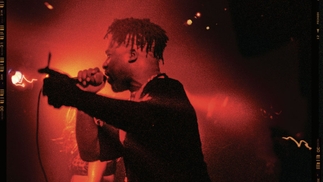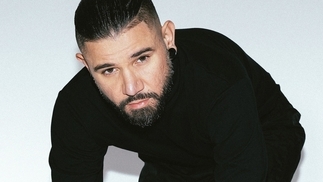FABIO & GROOVERIDER RENEGADES OF FUNK
No one represents drum & bass quite like DJs Fabio & Grooverider...
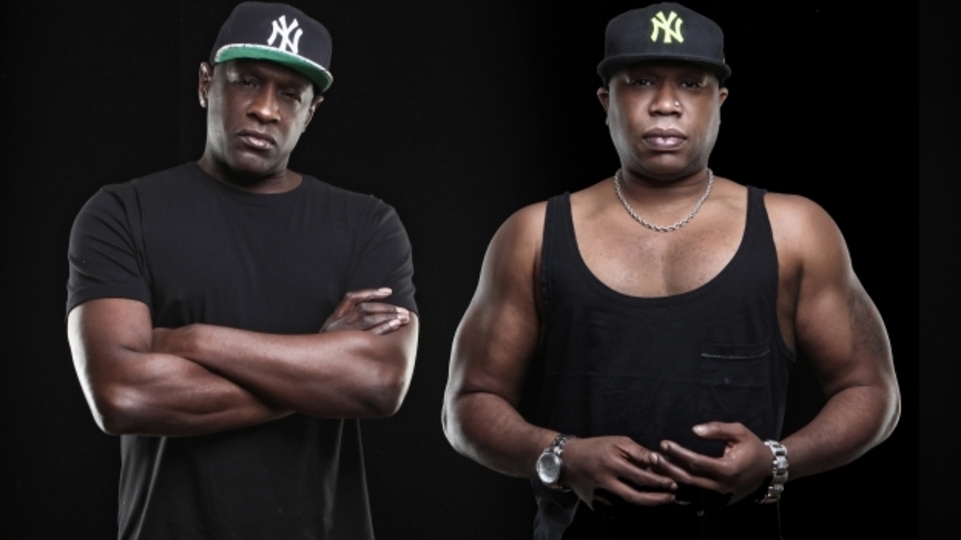
Sure, there are other obvious contenders, but Fab and Groove were there right at the beginning. They didn't just sit at the table — they made it, when their intense, raw mix of acid house, Belgian techno, hardcore and hip-hop breakbeats played at seminal club Rage effectively gave birth to jungle and the genre we now know as drum & bass.
Champions of the scene as a whole, they've repped d&b hard from the off, pushing new artists in their sets, on their labels Creative Source and Prototype, and on their long-running BBC Radio 1 show, starting the careers of many household names. Hugely versatile, they've moved with the times and technology, but never once strayed from the scene they helped bring into being.
The start of May sees them celebrate 25 years behind the decks with a party at London's The Forum on the 8th, so DJ Mag thought it high time to take stock of their career so far, delve into their history, where they think the scene is at today and lots more. We headed to Grooverider's house on the outskirts of South London to get a rare and very illuminating audience with the two architects of drum & bass...
Why are you celebrating 25 years? What exactly is it 25 years since?
Grooverider: “It sounds better than 28! It’s about 25 years since we really started getting serious about stuff.”
Fabio: “It was mid-'80s when we were on Phaze One. We really started about ’88, started being Fabio & Grooverider together properly and getting serious about everything.”
Where did you first start playing together?
F: “We started out doing Mendoza’s, a small club near where [pirate radio station they played on] Phaze One was, we took over the night and had our acid house night on Saturday night. And we used to play all night, innit! Literally from 9pm 'til whenever. It was an after-hours. Early doors we’d play house — we just went in, even when there was no-one there.”
G: “I’d known Fabio from the radio station, but I hadn’t DJ’d with him and the first time I DJ’d with him he’s played some tune and then Fabio got on the mic, and I thought ‘What’s he gonna say?’ The next thing, Fabio’s gone ‘Aciiiieed!’” [they collapse into laughter]. I was like, ‘What you doing?’
F: “I really can’t remember that, y’know.”
G: “I’d never been to Spectrum or Shoom, the first time I heard it in a club was when I was playing Mendoza’s, I’d never been to an acid club before, so when he did that... [makes a face — Fabio's uproarious laughter again] This was before Technics and all that, we was using belt-driven turntables — proper old skool. When you said that I was like [incredulous] — but in the nightclub world, Shoom people, that’s what they used to do.”
F: “There's a pic that Dave Swindells sent me, I've got it here [shows DJ Mag the above pic on his iPad]. We were in an underground car park after The Trip, Nicky Holloway's night, someone put on some music and people started dancing all across the road. Groove was going to his car, someone opened up their boot and started playing music, and they were just having it — properly jumping up on the lamposts, and here's me and Groove in the middle of all these ravers — this picture is sick, man.”
G: “Red bandanas — that’s the early days, man.”
F: “And me with fucking little sideburns as well [more laughter]. That was another thing, we were some of the only black people. If you look at that picture, we’re pretty much the only black guys — and we’re just sitting down, and people were on drugs as well, we were like ‘What’s going on?’ We didn’t do all that.”
Were you at the right place at the right time?
Fab: “I dunno, cos there weren’t a lot of DJs doing it.”
Groove: “You have to remember when acid house kicked off, we’re two urban kinda dudes who’ve grown up in black culture and all that, so when the house movement kicked off it was considered to be a gay thing. For us to be involved in it, it was like ‘What are they doing?’ People were looking at us like we were gay or something, do you know what I’m saying? It wasn’t that easy to get through, man.”
F: “When we started going out, there weren’t enough people even into it. There was only a few DJs playing it, it was something that came word-of-mouth from the streets. Groove just went to Spectrum on a Monday, Paul Oakenfold’s thing. I don’t even know how we heard about it, we just heard about it.”
G: “My opening into house music was when I was walking past My Price [in Croydon] one day. A DJ called Jazzy M used to work there, and he used to sell me hip-hop. This was a time when Public Enemy dropped that tune ‘Rebel Without A Pause’, that’s the exact day that I discovered house music cos I was in there buying that tune. He played a house track, Jamie Principle ‘Baby Wants To Ride’ and I was like, ‘What kind of music’s that?’ I was like, ‘Give me one of those’, and he started pulling them all out. That’s when it took off for me, man, but we was DJing before that —soul and funk and that. House just hit me more than anything else.”
F: “It was something new.”
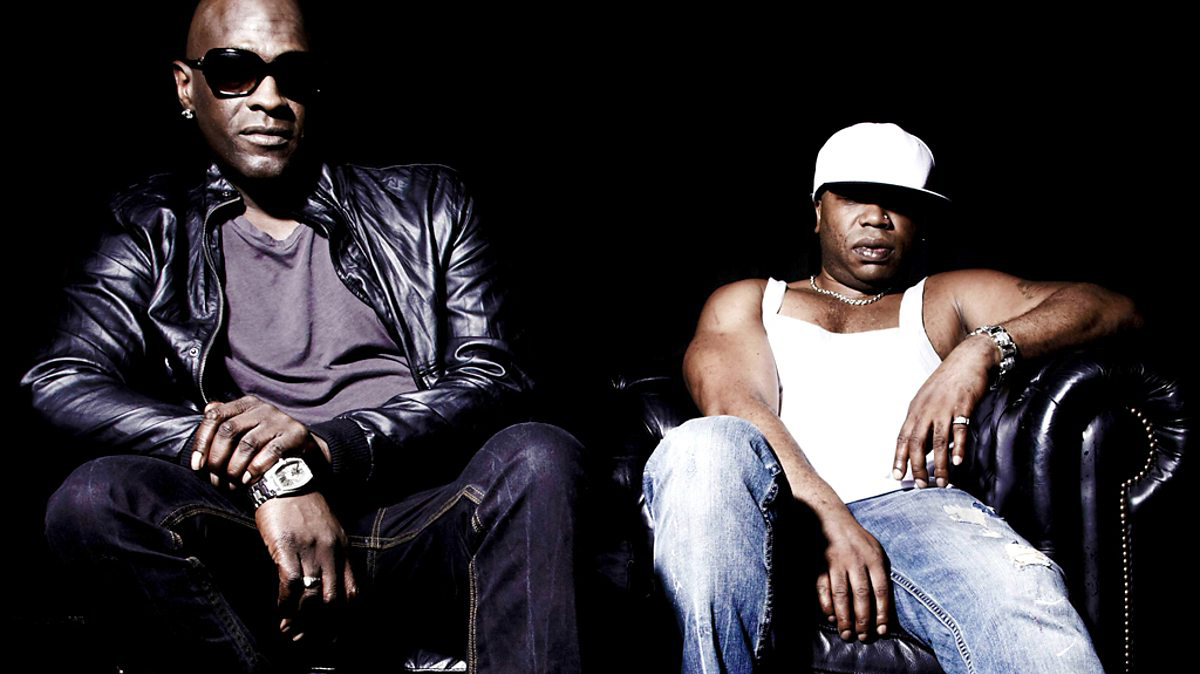
Was it because of your roots in funk & hip-hop that, when you started playing house and more breakbeat stuff came along, you started to incorporate that more?
F: “When acid house started off there was still acid, there was Chicago, there was what Frankie Bones was doing from New York. He was quite breakbeaty, he was doing the Bonesbreaks stuff, and the Bonesbreaks stuff used to have a little bit of a different vibe when you played it, when you played Bonesbreaks stuff people just got down in a different way — and we noticed that from early. So anytime we could incorporate... Groove used to play [Ice Cube's] ‘Amerikkka's Most Wanted’ and speed it up cos it had that kick kinda thing going on.”
G: “Yeah, turn a 33 into a 45, man — used to do that with that Masters At Work one as well. We was trying to make our own breakbeats within house music.”
F: “We wanted that sound. Once producers heard what we were doing with these tracks, and that they used to kick off, they started making stuff more like that.”
G: “You have to remember that a lot of people say that they invented jungle, but did they really? If we hadn’t have done what we did, at that speed, I don’t think it would’ve happened.”
A lightbulb going off for people...
F: “The first tune that came along like that was ‘We Are I. E’ [by Lennie De Ice]. We were like, ‘That’s what we’re trying to do’. It’s got the kick, the four-on-the-floor, the little breakbeat — that tune is what started it really for me and Groove. Then you used to get Ibiza Records and Vivid Dream and them kind of labels doing ‘jungle tekno’, but there weren’t a lot of it about. Me and Groove used to still have to play house and mix it all up, we couldn’t really play a jungle set cos there weren’t enough tunes. We were still into our house music as well, playing all kinda David Morales-type things, and Belgian stuff and techno-trance — all those tunes. We were just open to whatever was going on. I don’t think we really used to think, but we used to really do that — play five different genres of music. We didn’t really think ‘ Oh, we can’t really play this techno tune cos it ain’t gonna fit’. We didn’t give a shit.”
G: “If you did that today, you’d probably get something thrown at you!”
The club Rage where you played is thought to be pivotal to the whole evolution of the music, isn't it?
G: “Rage was the home of it, that’s where this music was born. You can’t say any different, you ask any DJ who was around at that time, ask them where the music was born, and they’ll tell you — it was born at Rage.”
F: “Yeah, it was.”
G: “There was also Paradise Club [AWOL], but that came after. It came out of what we were doing.”
F: “We were playing house, jungle and techno... John Digweed was our warm-up DJ, Carl Cox came down and played, Kevin Saunderson played...”
G: “He played his own drum & bass back in the day, he was one of the big breakbeat DJs of the time.”
Did you play a lot of dubplates at Rage?
G: “Yeah, I’ve still got a garage full of ‘em round the back!”
Fabio: “Ha ha ha! We were still playing vinyl stuff, but we were playing a lot of dubs.”
G: “Was there a bunch of stuff that never saw the light of day? Loads of it.”
F: “Seventy-percent of it, probably.”
Who were the first dance DJs to cut dubs?
G: “I dunno, it must’ve been us.
F: “Us and then Mickey Finn...”
G: “And the jungle DJs around at that time.”
F: “It came from soundsystems, it was a quick way of getting music and drawing a tune off someone — and staying ahead of the competition. It was a friendly rivalry, cos Groove would play something brand-new and everyone would talk about it. That would create a buzz on the track and it used to be...”
G: “All that’s lost now.”
F: “Ah man, I miss those days. You used to create a buzz on a tune. Like Bukem would come in with ‘Horizons’ and only me and Groove would have it — for ages. That’s how you do the hype. And people used to throw them up...”
What other tunes did you break off dubplate?
G: “Loads, Goldie’s early stuff, ‘Terminator’...
It cleared the dancefloor the first time you played 'Terminator' at Rage, didn't it? A lot of DJs wouldn’t have played it again...
G: “You’ve got to take your time with these things. Persist. This is why we are who we are, cos we persist. ‘Terminator’ didn’t sound like anything out there, but to me it sounded good. At the end of the day that’s why we are who we are, cos we persist with something when everybody else doesn’t hear a tune. Some tunes take five plays before people get them, and that’s why 28 years later we’re still doing the same thing.”
F: “I remember Groove coming up to me in the Hippodrome, saying ‘There’s this guy making some music, and he’s different to anyone else I’ve heard’, and then I saw Goldie come running over and he was just mad! Groove was really supporting his stuff, and when Groove got ‘Terminator’... no-one else had it, and they were all kind of screwing. We used to play B-sides as well, when you had house records with five different cuts, we used to try to play the cut no-one else was playing. We always tried to keep something different from what everyone else was doing.”
G: “You know the other tune that nobody got when I first played it? I had people looking at me like, ‘What the FUCK is he playing?’ ‘Lighter’ [by DJ SS]. That intro. The first time I played it, at Bagleys, I had all these MCs looking at me strange, cos of that intro. When the tune landed they were like ‘Fucking hell!’ That’s another tune I really remember, all these MCs just looking at me, like, with contempt.”
When did you notice the music start to change, to become something different, morph from rave into a new genre? What did you call it?
F: “It was Goldie that did that, Goldie changed things. The one before ‘Terminator’ they just sat down and thought, ‘We can’t make a tune like this, none of us could make tunes like this’. He brought a sound to drum & bass.”
G: “Before that it was very simple and... not Germanic, but you had happy hardcore which was like straight helium, and Goldie came with science.”
F: “He was chopping up breaks, he was doing something completely different, and I think everyone just thought ‘We need to step our game up’.”
F: “Even when you played jungle sets and you didn’t want to play jungle, a lot of the breaks are out of time — they weren’t made that well, it was more like a vibe. But then Goldie came along and everyone just thought ‘Right, we need to get our shit together, we need to get serious about this music now’. Get technical about it, which led onto the Metalheadz stuff.”
F: “There was always intelligent — Speed [Fabio and LTJ Bukem's club night] stuff. But that wasn’t of that technique at all. That was still going on the whole vibe aspect.”
You've often been associated together because of your DJ sets and Radio 1 show, but is it fair to say your tastes within drum & bass are quite varied? Your labels Prototype and Creative Source were very different...
F: “When me and Groove go out and do our long sets, we play everything. But within that, we created our own paths, which was another thing people don’t respect. Groove’s discovered the likes of Pendulum and all these big artists from the very start, and over this side I discovered the likes of Calibre — so we’ve helped spawn the whole scene, it’s still kind of down to me and Groove.”
G: “It doesn’t stop there — from that side of things, who broke Fred V & Grafix? Camo & Krooked? I played their tune before anybody else. When I think about Hospital Records, a lot of their artists is down to me.”
F: “You’d more likely think it was me, yeah. There were things on our radio show that you probably wouldn’t associate with me and Groove that we brought through as well. Nu:Tone — Groove came up to me and said ‘Y’know what, this guy has got a few tracks’, the Camo & Krooked and Fred V & Grafix, you listen to the radio shows and names that you probably wouldn’t associate with him...”
Fabio, you did get typecast as Mr Jazzy at one point, didn’t you?
F: “Yeah, thanks for bringing that up [laughs]. I went through a phase where a lot of the tunes I played were kind of jazzy, but it doesn’t mean don’t send me nothing else, cos I love everything. Sometimes in music there’s little ways you go for a while, and my little thing for a while was the jazzy thing. Then afterwards, if everyone starts copying you, then that thing starts getting played out. Then you’re known as Mr Jazzy for the rest of your life. And jazz is dead. You can’t ever do that. That’s why I’ve always tried to stay out of those little traps. You fall into those little traps, you’re not coming out of it. So it’s best to know that we play drum & bass — and that’s it. It’s a global thing. We can go anywhere and play this shit, and it’s all good.”
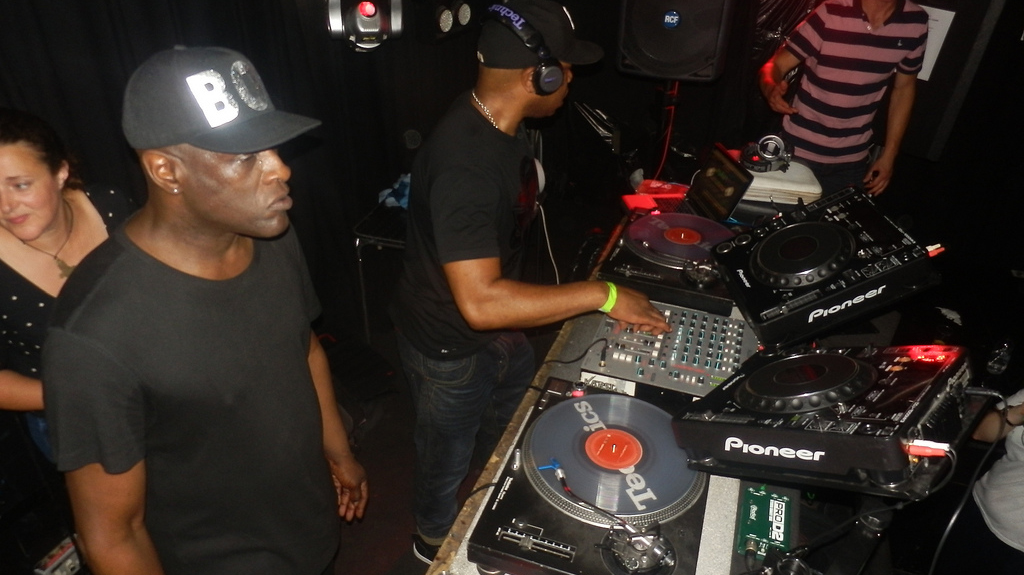
Do you ever plan your DJ sets at all?
G: “You judge a crowd, and play accordingly.”
F: “One thing about me and Groove is we don’t share music or nothing like that, Groove’s always had his tunes and I’ve had my tunes — we don’t mix that.”
G: “We don’t sit around and say, ‘Are you gonna play this?’”
F: “When we do back-to-back, we don’t know what we’re gonna play anyway, so we don’t plan our sets. Sometimes if Groove’s rolling out, I think ‘Stay on’. And vice versa. There’s no rules.”
G: “We don’t play tunes twice.”
F: “Yeah, there is certain rules that we’ve stuck to from the start. But the art of the DJ is gone.”
G: “You go to a party and you’re sitting there listening to the DJ. You play your set, and that DJ will be standing right next to you throughout your set, and come and try to play the same tunes and all that...”
F: “I just don’t get that. People have been brought up to think that shit like that is alright, but those are ground rules.”
G: “Don’t play tunes off the same label back-to-back...”
F: “People don’t have these kind of rules, and I think it’s because now you can sync your sets and all that kinda shit. Me and Groove just do it the old skool way, and always will do it the old skool way. But I try not to play too much jungle sets as well, cos I like today’s music, I don’t wanna keep playing old stuff all the time. You can get caught up in that as well, people thinking you’re just a jungle DJ. We always embrace new music.”
G: “You’ve gotta be receptive, man. We wouldn’t have got where we were if we hadn’t been — we’d still be playing R&B and soul.”
F: “Me and Groove were brought up on rhythms and basslines, and if it ain’t got that, I can’t really dig it. I can get into certain aspects of that mid-rangey kinda stuff, but I’m all about basslines really.”
What format do you play out from now?
F: “Even six months ago I was going, ‘Fuck USBs, I ain’t ever gonna use that shit’, and I got caught out once and I had to use ‘em — and I’ve not used CDs since. The CDJs were jumping, and I had everything on USBs and I thought, ‘Let me just try this’ — and I never looked back. I don’t even know where my CD case is now.”
G: “I’ve used Serato longer than anybody, I’ve always been into carrying thousands of tunes, it’s always been my thing. Even when I was using vinyl, I’d carry more records than anybody else.”
F: “That’s right, he used to carry four huge record boxes...”
G: “So for me to slim it down and just put it in my laptop worked for me.”
F: “You got to remember as well, travelling... towards the end of buying plates, I remember once I was talking to my accountant and he said ‘Do you know how much money you’re spending on dubs?’ and it was something like 11 grand a year. One plate was £60 at one stage, and we were going out and playing with plates and someone was coming along with a CD with the same tune on it in digital sound, and I started thinking ‘Why am I doing this?’”
G: “You was just wasting your money.”
F: “And also the fact that at the end of the day we paid our debt to vinyl and dubplates, cos we were carrying ‘em around for years. Breaking our backs.”
G: “I’ve got two rooms full of shit out there... [gestures towards his back garden]. “My thing has never been about spinning vinyl and all that bullshit, I just wanted what was on the vinyl — so how I got it didn’t really matter to me. I’m not one of those geezers putting records on thinking ‘That’s a great warm sound’, it’s all about what’s on the vinyl.”
Are d&b producers the most technically advanced?
G: “How many producers from outside drum & bass music have made a drum & bass tune and been successful? Whereas the amount of drum & bass producers who have stepped outside of their comfort zone and smashed it says an awful lot. Armand Van Helden — he made an alright little beat, as it goes, but he only made the one. Todd Terry did it, he made ‘Blackout’ and smashed it but he didn’t follow up. I didn't hear the drum & bass album that he made.”
Armand said he wasn’t allowed into the scene...
G: “Nah, your tunes do your talking, man.”
So he took d&b sensibilities and put them into his house tunes...
G: “Yeah, that’s why we liked his music, cos we could hear that in there.”
F: “He used to come to a lot of the parties — he’s a nice guy, man.”
G: “Yeah, proper dude. But in that aspect, I don’t know any producers who have come into drum & bass from outside and smashed it.”
F: “The amount of producers... Pendulum, Shy FX, Chase & Status, Sub Focus, Zinc, they’ve all come out of this scene, and I’ve got so much respect for all of these guys, cos they’re great producers and they’re authentic. They’re making some amazing music. And now Sigma are doing it, Futurebound & Matrix, Simon Bassline Smith, Wilkinson, there’s a lot of people out there... it’s healthy man.”
Why have you — and d&b — survived do you think?
G: “Cos the people who are genuinely into it are genuinely into it.”
F: “More than other genres, it’s a way of life to people. People that love it, they love it so much that even when they go onto other things, you’ll still always really love it. Once it gets you in there [points to chest]... We know guys who have left their wives over it, they’ve run out of money and they still love this music — you can’t explain it, man. You know what, even about five or six or 10 years ago I thought, ‘This music might die one day’, but it ain’t gonna die.”
G: “No, cos there ain’t nothing like it. Through the good and bad times, we’ve always represented our music. We ain’t turned around and said ‘We’re gonna do some garage shit or a dubstep thing’, we could’ve quite easily stepped over many a time.”
F: “Drum & bass, a lot of it is about energy, and the vibe you get from the clubs —which is what people get addicted to. Keep doing what you do, and it’ll all come back round. I still think I’m blessed, cos we’ve been able to make a living by doing this — we’ve never compromised, we’ve never sold out, and we’re still doing our thing in 2015. It’s amazing.”
It was Fab & Groove’s residency at Rage in London that really crystallised the drum & bass scene as it emerged out of hardcore rave. Speeding up hardcore tracks and cutting up breakbeats, from the start of the ‘90s onwards they acted as the catalyst for producers to start developing the jungle/drum & bass sound. They’d go on to host the most important drum & bass radio show in the world, nurture the talent of countless young producers, and generally act as great ambassadors for the scene. Big ups!
Words: Ben Arnold & Carl Loben
